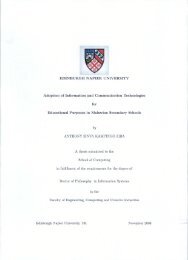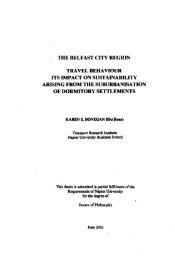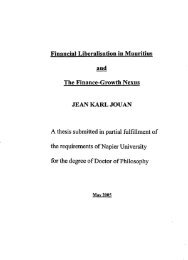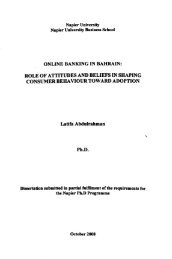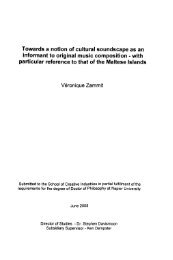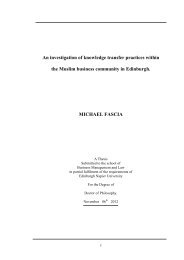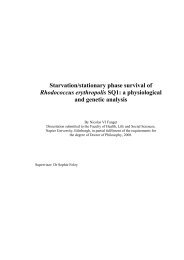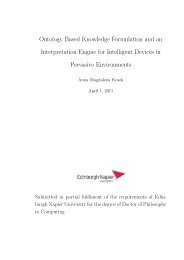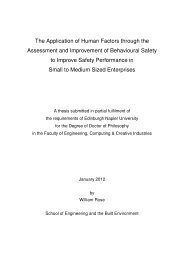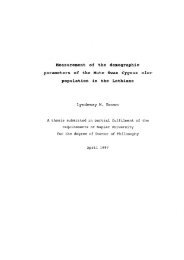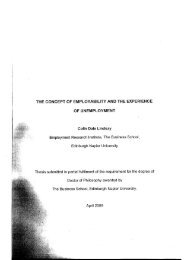The Role of Niche Tourism Products in Destination - Repository ...
The Role of Niche Tourism Products in Destination - Repository ...
The Role of Niche Tourism Products in Destination - Repository ...
You also want an ePaper? Increase the reach of your titles
YUMPU automatically turns print PDFs into web optimized ePapers that Google loves.
Many authors highlight the experiential and emotional nature <strong>of</strong> the tourism <strong>in</strong>dustry (Arnould and Price, 1993; Schmidt, 1997;<br />
Arnould, Price and Tierney, 1998). Academic tourism research however has paid little attention to emotionally driven consumption<br />
and niche tourism needs to be viewed beyond psychographic or behavioural <strong>in</strong>dicators to more participatory and experiential ones.<br />
<strong>Niche</strong> tourism can, therefore, be seen with<strong>in</strong> the context <strong>of</strong> the emergence <strong>of</strong> P<strong>in</strong>e and Gilmore’s (1999) ‘Experience Economy’.<br />
<strong>The</strong>y discuss how consumers crave experiences and want to make an emotional connection with their brand. Lew (2008) discusses<br />
how postmodern society has created the postmodern tourist or post-tourist (Feifer, 1985). <strong>The</strong> post modern tourist lives <strong>in</strong> a world<br />
<strong>of</strong> ‘hyper-consumerism’ where a plethora <strong>of</strong> products serve a crowded global marketplace with the role <strong>of</strong> market differentiation and<br />
segmentation <strong>in</strong>creas<strong>in</strong>gly important. Lew (2008) also notes that ‘brand<strong>in</strong>g, image and prestige rema<strong>in</strong> important to the post tourist’<br />
(Lew, 2008, p.412) and as they are time poor and experience hungry they are will<strong>in</strong>g to spend money <strong>in</strong> return for a quality, efficient<br />
and specialised service (Opaschowski, 2001). <strong>The</strong> result <strong>of</strong> the above trends <strong>in</strong> the consumer market is the rapid growth <strong>in</strong> self<br />
directed travel and SIT and the development <strong>of</strong> specialised niche tourism products.<br />
Dest<strong>in</strong>ations are now under greater pressure to develop products and services that elevate the experiences <strong>of</strong> tourists satisfy<strong>in</strong>g<br />
their desire for personal self enhancement and fulfilment (Formica and Kothari, 2008). This can be seen <strong>in</strong> the growth <strong>of</strong> the holistic<br />
or wellness tourism 5 niche sector (Smith, 2003; Smith and Kelly, 2006). It is also reflected <strong>in</strong> the recent trend for Western tourists to<br />
‘seek solace <strong>in</strong> Eastern philosophies and therapies....Such alternatives already pervade many Western societies, but tourists are<br />
<strong>of</strong>ten just as keen to visit the orig<strong>in</strong>s <strong>of</strong> the practice’ (Smith and Puczko, 2009, p.9.) This had led to micro niches be<strong>in</strong>g developed <strong>in</strong><br />
the wellness tourism sector such as yoga and spa tourism. <strong>The</strong> dest<strong>in</strong>ation is therefore critical as it <strong>of</strong>fers an alternative space<br />
5 ‘that which provides people with a range <strong>of</strong> activities and/or treatments aimed at develop<strong>in</strong>g, ma<strong>in</strong>ta<strong>in</strong><strong>in</strong>g, and improv<strong>in</strong>g the body-m<strong>in</strong>d-spirit’ (Smith and<br />
Kelly, 2006 <strong>in</strong> Kelly and Smith, 2009, p.73).



